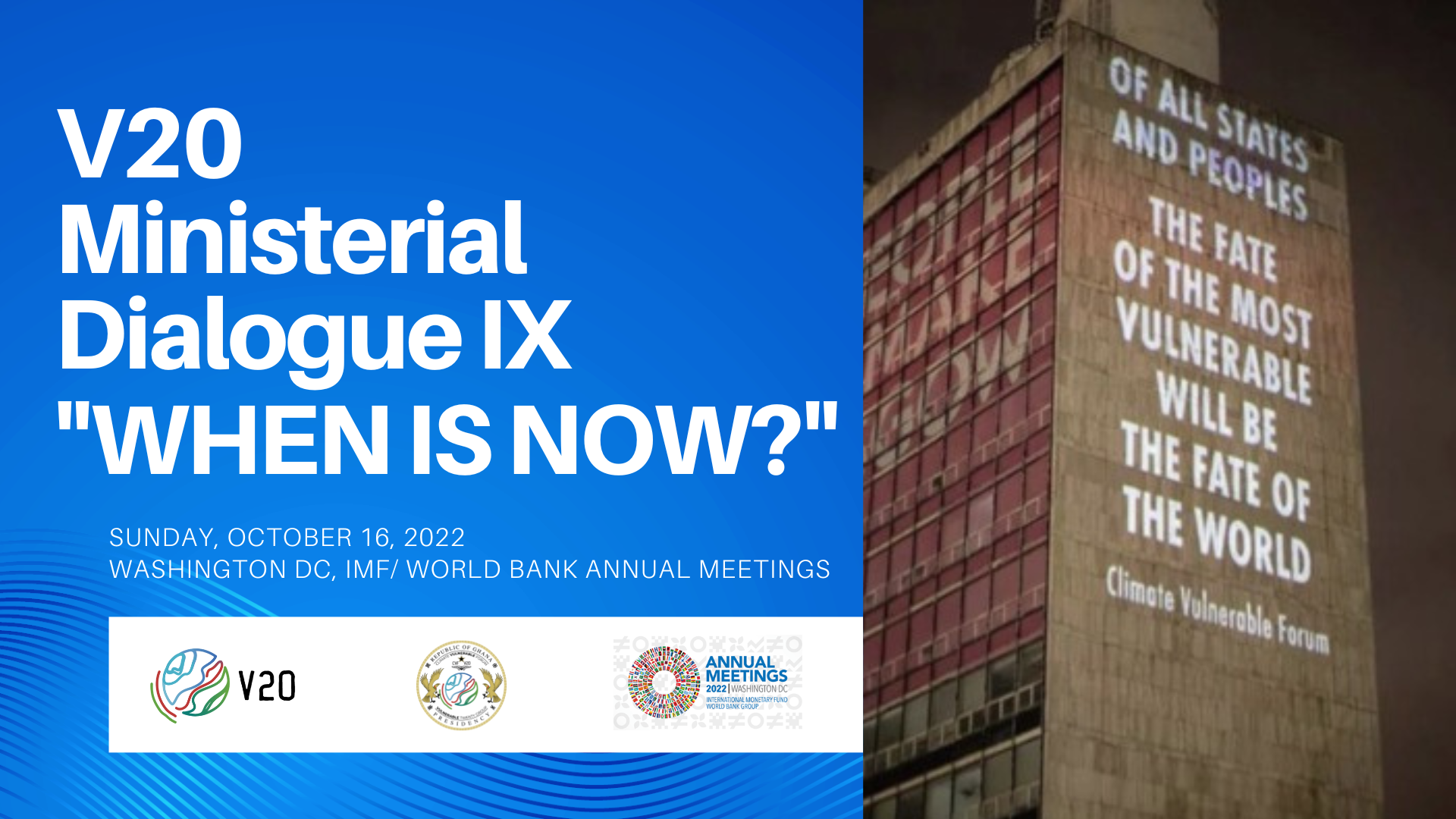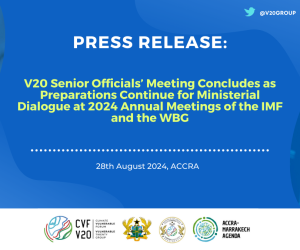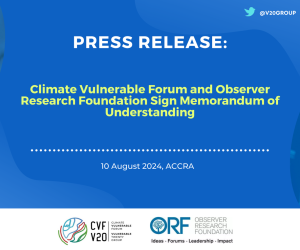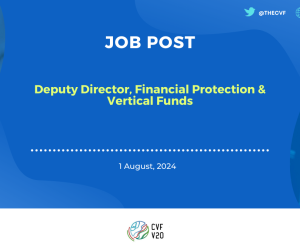V20 Ministerial Communique IX
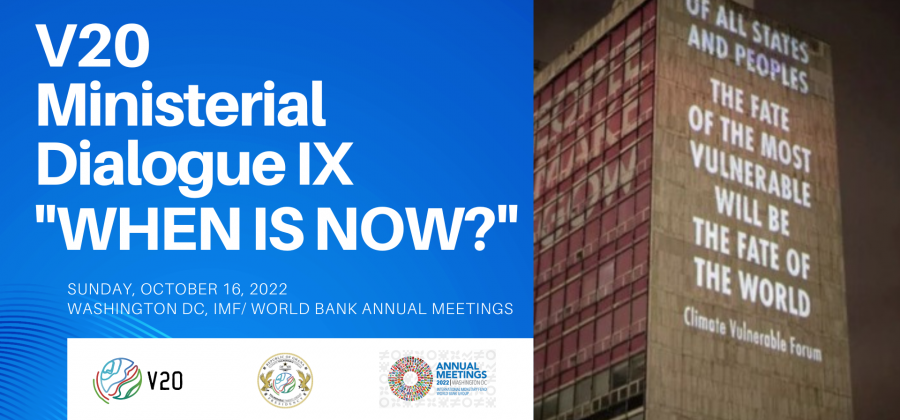
V20 Ministerial Communique
Ministerial Dialogue IX of the Vulnerable Twenty (V20) Group
16 October 2022, IMF/WB Annual Meetings
Adopted
We, Ministers and Senior Representatives of the Vulnerable Twenty Group of Ministers of Finance (V20) from Africa, Asia, the Caribbean, Latin America, the Middle East, and the Pacific, representing economies most vulnerable to the adverse impacts of climate change, meeting in-person, as convened in Washington, DC for the International Monetary Fund and World Bank Annual Meetings in October 2022,
Recalling the July 2021 V20 Climate Vulnerables’ Finance Summit Communiqué, the April 2022 V20 Ministerial Dialogue VIII Communiqué, and the October 2022 Accra-Kinshasa Communiqué of the Climate Vulnerable Forum (CVF),
We welcome the Republic of Ghana as the new Chair of the V20 following the conclusion of the tenure of Bangladesh in May 2022 and 3 new Ministers of Finance as members of the V20 following the confirmation of their governments’ membership by the CVF in October 2022 at UNFCCC Pre-COP27 in Kinshasa: Chad, Côte d’Ivoire and Kyrgyzstan,
Alarmed by the early findings of the Climate Vulnerability Monitor (CVM3) on the current and future global economic impact of climate change, and the disproportionate impact on V20 economies compared to effects faced by our counterparts in the Group of Seven (G7) and Group of Twenty (G20) with the G20 accounting for around 80% of all climate-polluting emissions,
Expressing grave concern at the failure of the G7 and G20 to align their policies with Paris Agreement goals, further exposing the fifty-eight (58) V20 economies to multiple and cascading risks now and in the future,
Highlighting that the V20 has at least 435 billion US dollars of debt servicing payments due in 4 years at a time when new investment is severely needed and when we have lost more than half a trillion worth of GDP growth over the last two decades coupled with a widening financial protection sinkhole of 98%, the effects of climate change are far reaching in terms of capital cost, inflation, debt ratings and other economic and financial terms,
Recognizing the growing proportion of V20 economies already in debt distress, or increasingly at risk of facing similar pain,
Reiterating the food and energy price and inflationary crisis that disproportionately penalizes V20 economies still struggling to recover from the COVID-19 pandemic’s direct and indirect shocks, and
Reaffirming that the 58 V20 economies serve as growth engines of the world economy, and that protecting the V20 will protect global economic growth, while enabling the V20 and its collective population of some 1.5 billion in its ambition of a resilient and green transition including the maximizing of renewable energy and adaptation will accelerate global transformation,
Moving in concert, urge multilateral financial institutions, development partners and the 2022 IMF/WB Annual Meetings in Washington, DC, as well as COP27 in Sharm El-Sheikh to respond decisively to the following key priorities:
- Climate Finance
- We call for an immediate reform of the sovereign debt restructuring architecture. Debt sustainability analyses need to be tailored to V20 member circumstances. Then, through guarantee facilities and regulatory action all creditor classes must be compelled to reduce the level of debt in V20 countries in order for them to mobilize financing for their climate and development goals.
- The V20 calls on the World Bank and other MDBs to implement all of the recommendations in the G20 expert panel that confirms that such development finance institutions can significantly expand their financing without jeopardizing their credit ratings.
- Firm in our belief that the combination of high debt servicing costs and climate change represents a systemic risk to the climate vulnerable economies of the V20 that can trigger a vicious cycle that depresses revenues, exchange rates, while increasing the cost of capital, and responding to climate shocks–all of which exacerbates climate vulnerabilities. We urge multilateral financing institutions to aspecify their commitment to climate investment and to deliver at least a doubling in international finance for adaptation within the next 30 months, with all Multilateral Development Banks (MDBs) ensuring their climate portfolios are at least 50% focused on climate adaptation.
- We call for further allocations of Special Drawing Rights, some of which should be ‘rechanneled’ into the IMF’s newly created Resilience and Sustainability Trust that should be enshrined in country ownership whereby V20 Climate Prosperity’s Plans form the core of recovery efforts.
- Having advocated the integration of physical climate and transition risks into the IMF Article IV instrument, we maintain it is critical to sustain reform and establish a fit-for-climate IMF with ongoing efforts to review, rethink, and continuously improve its “surveillance” approach to climate risks of all kinds in its Article IV surveillance activities with all economies. Likewise, we believe it is important to rethink and recalculate IMF debt limits to take into consideration climate change, and link debt flexibility and support to climate action along with guarantees, to avoid liquidity crisis and cost of capital repricing.
- We expect urgent progress on the delivery of the minimum USD100 billion a year goal commensurate with the emergency nature of the fallout of the global climate breakdown as it harms V20 economies and developing nations most, while calling for clear evidence of results through an update to the $100 billion Delivery Plan by COP27.
- We call on developed countries to urgently come forward with a standalone Implementation Plan of the UNFCCC COP26 decision for developed countries to at least double their collective provision of international climate finance for adaptation by 2025 towards a 50:50 balance between adaptation and mitigation finance, and to prioritize a high and increasing emphasis on grant-based funding for adaptation for frontline communities and economies.
- Official recognition of the V20
- We call on the World Bank and IMF to officially recognize the V20 as an official constituency of the World Bank and IMF, given the V20’s unique experience and expertise representing the common priorities and interests of 58 of the world’s most climate threatened developing economies, including least developed countries, small island developing states and nations that typically lack representation on monetary and development issues in the deliberations and decisions of the Bretton Woods Institutions. The finance ministers of the V20 have gathered since 2015 during the Annual and Spring Meetings of the IMF and World Bank, and will open an office in Washington DC in 2023.
- We seek to contribute to the agendas of the International Monetary and Financial Committee and the joint World Bank-IMF Development Committee, as well as other relevant fora.
- We ask the IMF to hold regular, bi-annual meetings with the V20 and, in doing so, provide the opportunity to develop and recommend joint actions for MDBs and bilateral partners especially with G7 and G20.
- Climate Prosperity Plans
- We seek to build momentum for domestic climate action through Climate Prosperity Plans (CPPs) and related strategies aiming to optimize climate action in the development and mobilization of finance and investment for domestic action and national development priorities.
- We recognize the 2022 CPP pipeline countries Ghana, Lebanon, Maldives, Rwanda, and Sri Lanka, and 2023 CPP pipeline countries Benin, Costa Rica, DR Congo, Kenya, the Philippines, Senegal, and the following countries to lead as Global Shield Pathfinder countries, namely Bangladesh, Ghana, Senegal, Costa Rica, Philippines, and Fiji, and the CPP pipeline thereafter with new resources mobilized, as well as to explore interest of Egypt, Jamaica, Malawi and Pakistan as pathfinder countries.
- We prioritize economic cooperation with G7 and G20 for investment and upscaled bilateral/multilateral resources, private sector participation, trade, technology transfer, tourism, and manufacturing capacity for the realization of Climate Prosperity Plans and for debt restructuring, including debt-for-climate swaps, providing an IDA guarantee, or broader debt restructuring that mobilizes resources for recovery aligned with country CPPs.
- We call on all creditors to the V20 economies to consider debt restructuring options including the redirection of debt servicing payments to climate resilience and energy transition investments and debt for climate swaps.
- We call on the IMF to align all IMF lending, including emergency liquidity it is providing so many V20 members with climate and development goals through CPPs in particular, including through any restructuring that may be necessary to enable new investment and in using the RST to facilitate a quick recovery aligned with green and inclusive prosperity.
- We call on the World Bank to align Country Climate and Development Reports with the CPPs
- Cost of Capital
- To offset high capital costs for climate investments and debt sustainability, the V20 seeks to mobilize additional resources in the form of guarantees, subsidy accounts, and the implementation of the V20’s Accelerated Financing Mechanism to maximize renewable energy and adaptation towards energy security and food security.
- Closing the Financial Protection Sinkhole
- We are determined to close the 98 percent (%) V20 financial protection gap – a massive economic fissure, a sinkhole – against climate risks principally through the G20/V20 InsuResilience Global Partnership and, its successor, the G7/V20 Global Shield against Climate Risks as critical financial protection cooperation, including through premium subsidies towards building domestic and regional markets through the Sustainable Insurance Facility, and for the key vehicles to always act in the best interest of their ultimate clients, the climate vulnerable countries and particularly LDCs and small island states. The implementation of the Sustainable Insurance Facility for enterprises and supply chains, and the Global Risk Modelling Alliance for risk analytics and modelling, are central to addressing the private financial protection fissure across V20 member states. Equally important is to reduce indebtedness through the course-correction of instruments that drive indebtedness post-disaster or are expensive relative to other disaster risk financing options for LDCs, SIDSs and emerging economies, such as Catastrophe Bonds.
- We also call on donors, development partners, and the MDBs to support the work of the various regional risk pools to reduce indebtedness and increase access to pre-arranged financing – African Risk Capacity (ARC), Pacific Catastrophe Risk Insurance Company (PCRIC), and Caribbean Catastrophe Risk Insurance Facility (CCRIF-SPC) – that service the V20 economies in closing the public financial protection gap.
- Carbon Markets
- Further to our commitments on implementing domestic carbon pricing mechanisms, we seek access to market-based carbon financing opportunities (e.g. forest, soil and ocean carbon assets) to complement finance for domestic climate action. To this end, the V20’s Carbon Finance Development Program is key with the aim of generating interest and development of carbon finance projects across the V20 economies.
- Loss and Damage
- We urge all major polluting nations and companies to contribute finance to address loss and damage in light of the shortfall of action and finance on adaptation and mitigation, as well as the escalation of impacts on the most vulnerable and least equipped countries and economies.
- With the glaring evidence of the loss and damage faced by V20 economies, the V20 has fundraised to commission a V20 Loss and Damage Funding Program, with the intention to complement adaptation and development interventions, to inspire rapid international resource mobilization initiatives for loss and damage. Once the V20’s program undertakes funding commitments to climate vulnerable V20 economies in 2022.
- We call for the development and launch of the G7/V20 Global Shield against Climate Risks to accelerate efforts of targets of InsuResilience Global Partnership that rapidly scales up financial protection for the most vulnerable, including as a contribution to the implementation of the Paris Agreement and the success of COP27 in Sharm El-Sheikh.
- We urge COP27 to mandate all multilateral institutions including the Global Environment Facility to fully integrate addressing loss and damage as an instrument and a new addition to country envelopes, and for the financial architecture to include loss and damage instruments as part of the composition of support.
- We seek funding commitments into the Global Shield, as part of comprehensive funding arrangements to address mounting loss and damage by responsible nations under the Paris Agreement. The Glasgow Dialogue on loss and damage must serve to deliver this objective with clear actions taken by COP27, rather than the Dialogue merely serving as a multi-year “talk shop”.
- Spurred by vulnerable country initiatives that helped deliver the IPCC Special Report on 1.5, we call to expand international dialogue and the knowledge base on climate change attributable loss and damage through the commissioning by COP27 of an IPCC Special Report on Loss and Damage, building on the third edition of the Climate Vulnerability Monitor (CVM3), which will be launched before COP27, with derivative economic and finance market implication studies, and regularly updating of the CVM3 tool.
Adopted in Washington, DC on 16 October 2022.
Member States of the Vulnerable 20 Group of Ministers of Finance (V20)
Formed in 2015, the V20 Group of Finance Ministers is a dedicated cooperation initiative of economies systematically vulnerable to climate change. It is currently chaired by the Republic of Ghana. The V20 membership stands at 58 economies representing some 1.5 billion people including Afghanistan, Bangladesh, Barbados, Benin, Bhutan, Burkina Faso, Cambodia, Chad, Colombia, Comoros, Costa Rica, Côte d’Ivoire, Democratic Republic of the Congo, Dominican Republic, Eswatini, Ethiopia, Fiji, The Gambia, Ghana, Grenada, Guatemala, Guinea, Guyana, Haiti, Honduras, Kenya, Kiribati, Kyrgyzstan, Lebanon, Liberia, Madagascar, Malawi, Maldives, Marshall Islands, Mongolia, Morocco, Nepal, Nicaragua, Niger, Palau, Palestine**, Papua New Guinea, Philippines, Rwanda, Saint Lucia, Samoa, Senegal, South Sudan, Sri Lanka, Sudan, Tanzania, Timor-Leste, Tunisia, Tuvalu, Uganda, Vanuatu, Viet Nam and Yemen.
**As a UN non-member observer state
Reference Documents
- V20 Ministerial Dialogue VIII Communique (link)
- V20 Climate Vulnerables’ Finance Summit (link)
- Climate Vulnerability Monitor, Third Edition (CVM3) (launched before COP27)
- V20 Debt Review (link)
- V20 Statement on Debt Restructuring (link)
- Climate Vulnerable Economies Loss Report (link)
- V20 Vision 2025 (link)
- V20 Climate Prosperity Recovery Agenda (link)
- Accra-Kinshasa Communiqué (link)
- Designing a Resilience and Sustainability Trust: A Development-Centered Approach (link)


